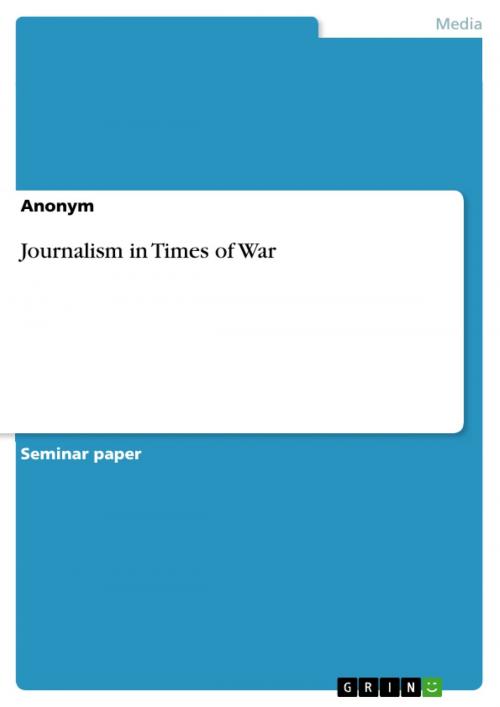| Author: | Anonymous | ISBN: | 9783638584890 |
| Publisher: | GRIN Publishing | Publication: | January 14, 2007 |
| Imprint: | GRIN Publishing | Language: | English |
| Author: | Anonymous |
| ISBN: | 9783638584890 |
| Publisher: | GRIN Publishing |
| Publication: | January 14, 2007 |
| Imprint: | GRIN Publishing |
| Language: | English |
Seminar paper from the year 2006 in the subject Communications - Movies and Television, grade: 1,0, Northwestern University, 12 entries in the bibliography, language: English, abstract: World War II saw the beginning of radio broadcasting of wars. Walter Cronkite, stationed in London, reported from the city as it was hit by German bombers. He reported on the everyday life and suffering of the Londoners in his characteristic mixture of in-formativeness and gripping imagery. The reporter risked his life in standing on the roof of his hotel for better oversight of the nightly air raids and also for transmission reasons. Later in the war, Cronkite also accompanied British planes as they flew air raids against German cities, especially Berlin. What makes Cronkite's reports so special is their gripping style and their deep humanism. Cronkite could narrate with an intensity that made it possible for the average American who had never left his country to actually feel the atmosphere of dread in London. This is a strength in a reporter, because it allows for an emotional involvement of the audience, beyond their intellectual understanding. Before the advent of the television, this was even more important. This does not mean, however, that today such a quality would be less important - the images transported by the camera need to be selected and put into context too. In that way Cronkite is still a role model for current journalism. The other stark point of this reporter was his deep respect for every human, every individual, nearly independent of his or her nationality. For me, it was amazing to hear Cronkite report with the same eye for suffering on London and Berlin, although he only saw the latter from above. However, he imagined the suffering there must be in the city, being one sea of flames after the raid. In my eyes, there is no higher praise for a reporter than to say he gave his audience a sense of humanity, a sense of the universality of the human struggle and suffering - such reporting goes far beyond what we can expect to see today, both in U.S. and German television.
Seminar paper from the year 2006 in the subject Communications - Movies and Television, grade: 1,0, Northwestern University, 12 entries in the bibliography, language: English, abstract: World War II saw the beginning of radio broadcasting of wars. Walter Cronkite, stationed in London, reported from the city as it was hit by German bombers. He reported on the everyday life and suffering of the Londoners in his characteristic mixture of in-formativeness and gripping imagery. The reporter risked his life in standing on the roof of his hotel for better oversight of the nightly air raids and also for transmission reasons. Later in the war, Cronkite also accompanied British planes as they flew air raids against German cities, especially Berlin. What makes Cronkite's reports so special is their gripping style and their deep humanism. Cronkite could narrate with an intensity that made it possible for the average American who had never left his country to actually feel the atmosphere of dread in London. This is a strength in a reporter, because it allows for an emotional involvement of the audience, beyond their intellectual understanding. Before the advent of the television, this was even more important. This does not mean, however, that today such a quality would be less important - the images transported by the camera need to be selected and put into context too. In that way Cronkite is still a role model for current journalism. The other stark point of this reporter was his deep respect for every human, every individual, nearly independent of his or her nationality. For me, it was amazing to hear Cronkite report with the same eye for suffering on London and Berlin, although he only saw the latter from above. However, he imagined the suffering there must be in the city, being one sea of flames after the raid. In my eyes, there is no higher praise for a reporter than to say he gave his audience a sense of humanity, a sense of the universality of the human struggle and suffering - such reporting goes far beyond what we can expect to see today, both in U.S. and German television.















